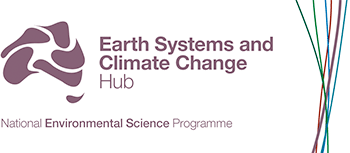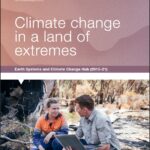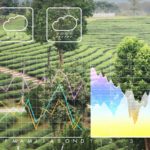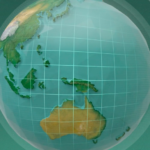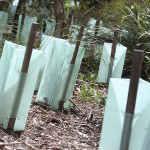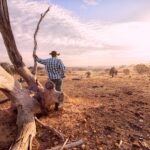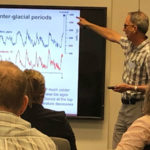From research into climate extremes and climate variability to global and regional carbon budgets, the Earth Systems and Climate Change Hub played a significant role in advancing the understanding and management of Australia’s changing and variable climate. Read more about our achievements in our landmark summary report, Climate change in a land of extremes: Earth Systems and Climate Change Hub (2015-2021).
Extremes
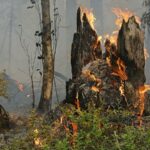
Brochures
- Fire-generated thunderstorms and climate change in Australia – outlines recent research conducted under the ESCC Hub on current and future trends of fire-generated thunderstorms.
- Intense east coast lows and climate change in eastern Australia – outlines recent research conducted under the ESCC Hub on current and future trends and impacts of intense east coast lows.
- Tropical cyclones and climate change in the Great Barrier Reef region – outlines recent research conducted under the ESCC Hub on changing tropical cyclone trends in the Great Barrier Reef region.
- Bushfires and climate change in Australia – synthesises knowledge and ESCC Hub research on bushfires in Australia, including how they have changed to date and how they may change in the future under a changing climate.
- Thunderstorms and climate change in Australia – synthesises knowledge and ESCC Hub research on thunderstorms in Australia, including how they have changed to date and how they may change in the future under a changing climate.
- East coast lows and climate change in Australia – synthesises knowledge and ESCC Hub research on east coast lows in Australia, including how they have changed to date and how they may change in the future under a changing climate.
- Tropical cyclones and climate change in Australia – synthesises knowledge and ESCC Hub research on tropical cyclones in Australia, including how they have changed to date and how they may change in the future under a changing climate.
Science impact stories
- What causes dry extremes across southern Australia? – outlines research by the ESCC Hub to investigated the causes of dry periods across southern Australia to determine how unusual these extreme dry periods are and how likely we are to see more of them in the future.
- What role does climate change play in extreme events? – provides a science update on the causes and drivers of extreme events, how researchers attribute the role of climate change to events, and examples of recent extreme events in Australia.
- Characterising extreme fire conditions – our researchers have produced a dataset of weather conditions influencing fire activity extending back to the 1950s, providing the big picture with regards to fire weather in our changing climate.
Climate change projections
Brochures
- Our changing climate: using climate change information to 2030 – explains climate change and climate variability and how to take both into account for short-term (10-20 year time horizon) decision-making.
- Towards the next generation of climate change projections for Australia – summary of a proposed approach and timeline for a new future suite of climate change projections.
Science impact stories
- New global climate models and what they say about projections of Australia’s future climate – outlines how Earth Systems and Climate Change Hub researchers have studied a suite of new global climate models to evaluate their improved ability to project future changes to Australia’s climate.
- Reframing climate change projections for global warming levels – outlines how the ESCC Hub has produced new climate change projections information which relate Australia’s future climate to a range of future global warming levels. This allows users to visualise and compare Australian climate change impacts under different global warming levels.
- Adding value to climate change projections through regional climate modelling – the ESCC Hub has investigated the value of using regional, high resolution climate models to better understand Australia’s future climate, and whether these downscaled projections provide more value than projections from the lower resolution global climate models.
Climate modelling
- Australia’s national climate model, ACCESS – explains the importance of our national climate model (ACCESS) and the Hub’s work to improve and apply ACCESS to better understand our past and future climate.
Carbon budgets
- Global and regional carbon budgets – provides an overview of carbon budgets and research under the ESCC Hub to contribute towards efforts to develop a global carbon budget, develop an Australian carbon budget and track and project human-caused emissions.
Water futures and drought
Brochures
- Drought projections for Australia – outlines updated and improved drought projections for Australia delivered through the ESCC Hub at a national and regional level. The new drought projections investigated how time spent in drought, mean drought duration, drought frequency, and drought intensity may change under a warmer climate.
- Climate change impacts on the reliability of farm dams and environmental flow in south-west Western Australia – outlines how the ESCC Hub collaborated with the Western Australian Department of Water and Environmental Regulation to enhance understanding of the reliability of farm dams and environmental flows in the south-west Western Australia Wilyabrup Brook catchment for a range of climate change scenarios.
- Projections of water futures for Australia – outlines research by the ESCC Hub to updated existing projections of water resource (or water availability) and develop projections of hydrological characteristics across Australia.
- Our changing climate: How will rainfall change in Northern Australia over this century? – explains observations and projections for rainfall and other climate variables in the north.
- Our changing climate: Southern Australia rainfall – long-term trends and future projections – explains long term trends and projections of rainfall, including extreme rainfall, in southern Australia.
Science impact stories
- Flash drought in Australia – outlines ESCC Hub research to progress scientific understanding of the nature of flash droughts in Australia, including when, where and why flash drought occurs, and what tools might be most useful for identifying and monitoring them.
- Understanding climate change impacts on water resource management in Western Australia – the Hub engaged with the WA Department of Water and Environmental Regulation to determine their climate change science needs.
Oceans and coasts
Brochures
- The National Centre for Coasts and Climate: establishment and key research outcomes – provides a summary for recent research outcomes under the National Centre for Coasts and Climate under the ESCC Hub on how blue carbon ecosystems, coastal erosions and ecological engineering solutions to enhance the capacity of coastal ecosystems to adapt to climate change.
- The Australian guide to nature-based methods for reducing risk from coastal hazards – these guidelines aim to translate global and Australian research into a practical tool that can be used to support decisions by coastal practitioners to use nature-based methods.
- Eco-engineering and restoration of coastal habitats in Australia – synthesises the latest understanding of nature-based coastal defence, including how nature-based solutions can deliver more sustainable and adaptive methods to protect the coast.
- Coastal erosion under a changing climate – ESCC Hub and NCCC researchers are improving the understanding of the underlying drivers of coastal erosion which will lead to improved predictions of future erosion.
- Climate change and blue carbon in Australia – ESCC Hub and NCCC researchers have developed methods to reduce uncertainty in determining blue carbon accumulation rates, which will support the inclusion of blue carbon ecosystems in emission trading schemes.
- Understanding coastal erosion on beaches: A guide for managers, policy makers and citizen scientists – Hub researchers, through the National Centre for Coasts and Climate, have developed an introductory guide to the dynamics of beach erosion and the impacts of beach movement on human infrastructure.
Science impact stories
- Our changing oceans: Australia’s contribution to the Global Ocean Observing System – outlines how the ESCC Hub has helped to support many of Australia’s operational, data management and quality control activities of important global ocean observation networks.
- Insights into updating and using sea-level rise projections – outlines work under the ESCC Hub to contributed to international research to better understand and estimate future sea-level rise, including revised contributions from melting Antarctic ice sheets; and how sea-level rise projections are used, and the best approaches to developing, tailoring and communicating these projections based on the needs of users.
- Understanding future extreme sea level events for Sydney’s beaches and harbour – outlines research by the ESCC Hub which has investigated how extreme sea level events may change for Sydney’s beaches and harbour under a warmer climate.
- Marine heatwaves off Western Australia: future projections – outlines work by the ESCC Hub to investigated the likelihood of marine heatwaves with a similar intensity and duration occurring on the coast of Western Australia in the future.
- Marine heatwaves in the Tasman Sea: future projections – outlines work by the ESCC Hub to investigated the likelihood of marine heatwaves with a similar intensity and duration to these two events occurring in the Tasman Sea in the future.
- Climate change services for Australia’s blue economy – The ESCC Hub has established a set of climate change projection products to support development of offshore climate change management and adaptation strategies.
- Wind-wave climate change along Australia’s coast – outlines ESCC Hub research to assess how wind-waves may change around Australia under a future warmer climate.
- Sea-level rise information for councils – our researchers have prepared comprehensive sea-level projections for all coastal councils in Australia, making it easier for council planners and managers to know how sea-level rise will affect their council.
- Making coastal hazards information accessible – the Hub has re-developed a much used but old sea-level research website into a new portal that brings together information on an expanded range of coastal hazards including sea-level change, waves, coastal extremes and ocean energy.
- Understanding marine heatwaves – provides a science update on current global and Australian trends in marine heatwaves, future trends and the role of climate change.
- Improving coastal inundation models for adaptation planning – the Hub worked with the City of Greater Geelong and Data61 to determine how our work on coastal extremes could feed into a coastal adaptation planning tool.
Reports
- Ocean knowledge supporting climate decisions – summarises ocean research conducted by the ESCC Hub into the role of the ocean in the climate system. The Hub’s analysis and investigation of ocean observations, ocean modelling and assessment studies have laid the foundation for more reliable predictions and projections of severe climate events, global and regional sea level rise and development of future climate scenarios.
Climate variability and change
Reports
- Exploring drivers of Australia’s variable and changing climate – outlines the world-class research conducted by the ESCC Hub to increase understanding and knowledge on how our variable climate is likely to change under increasing greenhouse gas concentrations.
Science impact stories
- What causes dry extremes across southern Australia? – outlines research by the ESCC Hub to investigate the causes of dry periods across southern Australia to determine how unusual these extreme dry periods are and how likely we are to see more of them in the future.
- What role does climate change play in extreme events? – outlines Hub efforts in advancing
the scientific field of ‘attribution’ of the extreme climate events to determine the factors, including human-induced greenhouse gas emission, behind many events recently experienced in Australia.
Indigenous science and engagement
- Co-design, cross-cultural communication and climate change: considerations for engaging with First Nations peoples – provides a summary of important considerations for co-designing climate change-related research projects with First Nations peoples.
- Climate change in the Torres Strait: implications for fisheries and marine ecosystems – describes the outcomes of a 2017 workshop jointly run by the Earth Systems and Climate Change Hub and the Torres Strait Regional Authority. The workshop considered the cascading consequences of climate change on Torres Strait fisheries.
- National Indigenous Dialogue on Climate Change: workshop report – this report is based on information shared at the National Indigenous Climate Dialogue workshop held at Barmah Forest on 12–15 November 2018. The workshop aimed to encourage collaboration and mutual benefit in enhancing a two-way understanding of climate change.
- Indigenous perspectives of risk. Learning and sharing knowledge for climate change: workshop report – presents the results of a co-designed workshop with the Malgana People which focused on two knowledge-sharing tools: seasonal calendars and mapping.
- Sources of resilience, vulnerabilities and uncertainties in Indigenous – this report synthesises recent literature on Indigenous Peoples’ planning for climate change.
- National First Peoples Gathering on Climate Change: workshop report – this report captures First Nations Peoples experiences of understanding and responding to extreme events associated with climate change as shared at the Gathering held 22-16 March 2021, as well as their aspirations expressed through the Gathering Statement, and details of the co-design processes developed.
- National First Peoples Gathering on Climate Change: Summary Fact Sheet – this summary provides an overview of the Gathering and First Nations Peoples aspirations expressed through the Gathering Statement, as well as details of the co-design processes developed.
Informing policy planning
ESCC Hub reports requested by the National Climate Science Advisory Group
- Australia’s Next Generation of Regional Climate Projections
- Informing strategic development of a national climate services capability for Australia
Building climate science capacity
- Building capacity to use change change information – outlines the ESCC Hub climate change information toolkit to build both understanding of climate change and capability for using climate change information for decision making.
- Climate change in the Northern Territory: state of the science and climate change impacts – prepared by the Hub for the Northern Territory Government, this report provides Territorians with an easy-to-understand summary of climate change: what it is, how it’s affecting the Territory and what we can do about it.
- Climate change information for local government – the Hub carried out a small case study to guide the development and delivery of climate change information for councils.
- Connecting young scientists and data users – the Hub has established a Young Professionals Network to support both early career climate science researchers and sector-based young professionals to develop technical capacity to deliver and apply climate change science.
Climate change information and services
- Understanding the climate change information needs of the financial services sector – provides a summary of the findings from engagement with the financial services sector to identify the science-based climate change data and information needs of the sector.
- What are climate change science and services worth? – provides a summary of a Hub developed conceptual cost-benefit framework to measure the economic value of the Hub’s research outputs to the Australian economy and society more generally.
- Understanding climate change impacts on cloud forests in the Gondwana Rainforests of Australia – a case study factsheet about how the ESCC Hub worked with property managers to develop and analyse information about changes to the cloud base for the Gondwana Rainforests of Australia World Heritage Area to inform climate change adaptation planning for the area.
- Impact of climate change on flowering induction in mangoes in the Northern Territory – outlines the co-produced impact assessment which combines projections of future climate with what we know about the response of mango flowering to particular temperature thresholds to provide an important insight into Northern Territory mango production into the future.
- Climate change and the Shark Bay World Heritage Area: Foundations for a climate change
adaptation strategy and action plan – outlines the outcome of a workshop to lay the foundations for the development of a climate change adaptation strategy and action plan for the Shark Bay World Heritage Property using a rapid assessment tool (Climate-change Vulnerability Index).
Highlight brochures
- Meeting Australia’s climate challenges – highlights from the first half of the Hub’s research program
- Australia’s changing climate (Australian Climate Change Science Programme) – a useful starting point for anyone wanting to better understand how Australia’s climate has already changed, and how it will change into the future.
Teleconnections
Teleconnections is the Hub’s periodic newsletter. Browse through our past issues:
- Issue 11, May 2021
- Issue 10, December 2020
- Issue 9, October 2020
- Issue 8, June 2020
- Issue 7, December 2019
- Issue 6, June 2019
- Issue 5, December 2018
- Issue 4, June 2018
- Issue 3, August 2017
- Issue 2, April 2017
- Issue 1, December 2016
